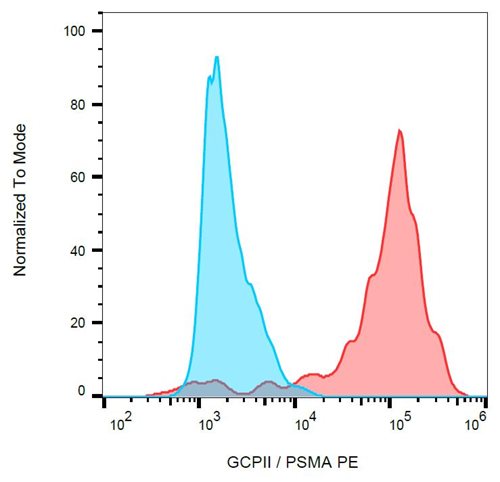PE Conjugated, Anti-GCPII / PSMA Monoclonal Antibody (Clone:GCP-05)

Figure 1: Surface staining (mass cytometry) of LNCaP cell line using anti-GCPII (GCP-05) 173Yb. Gated on singlets.
Roll over image to zoom in
Shipping Info:
For estimated delivery dates, please contact us at [email protected]
| Amount : | 0.1 mg |
| Isotype : | Mouse IgG1 |
| Storage condition : | Store in the dark at 2-8°C. Do not freeze. Avoid prolonged exposure to light. |
Glutamate carboxypeptidase II (GCPII), also known as N-acetyl-alpha-linked acidic dipeptidase I (NAALADase I), folate hydrolase (FOLH1), and prostate-specific membrane antigen (PSMA), is an approximately 95-110 kDa type II transmembrane glycoprotein expressed in various tissues. In nervous system GCPII cleaves abundant N-acetylaspartylglutamate, which is released from neurons in a calcium-dependent manner, to N-acetylaspartate and glutamate. As immoderate glutamate concentration is neurotoxic, GCPII contributes to pathological conditions regarding e.g. Alzheimer´s disease, Huntington´s disease, epilepsy, schizophrenia, stroke or neuropathic pain and appears to be an interesting therapeutic target. In jejunum GCPII hydrolyzes pteroylpoly-gamma-glutamate to folate and glutamate, enabling folate to be absorbed by gastrointestinal tract. GCPII, which is present in a number of tissues at low levels, is overexpressed in neovasculature of most solid tumours and is a target enzyme for diagnosis and treatment of prostate cancer. Normal human prostate express more mRNA coding for a cytosolic GCPII form truncated at the N-terminus (PSM´) than mRNA for membrane-bound GCPII, and this ratio is reversed upon malignant transformation.
| Subcellular location: | Cytoplasm |
| Post transnational modification: | The N-terminus is blocked. |
| BioGrid: | 108630. 5 interactions. |
|
There are currently no product reviews
|






















.png)












